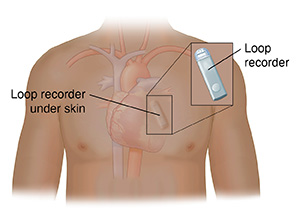Loop Recorder Implantation
An implantable loop recorder (ILR) is a device that records information about your heart rhythm. It's used for people who have symptoms of heart arrhythmias that occur infrequently. During implantation, a small device is inserted under the skin to the left of your sternum over your heart. The device works as an ongoing electrocardiogram (ECG). It constantly picks up electrical signals from your heart and stores the information for later review. An ILR records for up to 3 to 4 years.

What to tell your healthcare provider
Tell your healthcare provider about all the medicines you take, especially any blood thinners. This includes over-the-counter medicines like ibuprofen. It also includes vitamins, herbs, minerals, and other supplements, and any illegal drug use. Tell your healthcare provider if you:
-
Have had any recent changes in your health, such as an infection or fever
-
Are sensitive or allergic to any medicines, latex, tape, or anesthesia (local and general)
-
Are pregnant or think you may be pregnant
Tests before your procedure
Before your loop recorder implantation, you may need an electrocardiogram (ECG). During this test, sticky pads called electrodes will be put on your chest. Wires will be attached to the pads. These wires lead to a machine. The machine measures your heart’s electrical activity for a short period of time.
Getting ready for a loop recorder implantation
Talk with your healthcare provider about how to get ready for your procedure. You may need to stop taking some medicines before the procedure, such as blood thinners and aspirin.
Also, make sure to:
You will be asked to sign a consent form that gives your permission to do the procedure. Read the form carefully. Ask questions if something is not clear.
During your procedure
Ask your healthcare provider about what to expect during your procedure. A typical procedure goes like this:
-
The skin over the heart area will be cleaned and may need to be shaved.
-
The healthcare provider will inject local anesthesia medicine into your skin to numb it.
-
The healthcare provider will make a small nick in your skin. This is usually done in the left upper chest, over the heart.
-
The healthcare provider will insert the loop recorder underneath the skin through the skin nick. The machine is about the size of a flat AAA battery.
-
The healthcare provider will close the nick with either glue or stitches. They will put a bandage on the area.
After your procedure
You will be shown how to use the symptom activator, if you need one. The symptom activator is used to turn on device recording to relate the symptoms you feel with what is happening in your heart at that time.
You will likely be able to go home the day of the procedure.. You can take pain medicine if you need it. Talk with your healthcare provider about what’s best to take.
You can go back to your normal activities as soon as you feel able.
Don't get the incision wet until your healthcare provider says it's OK. Don't do any vigorous exercise until your provider gives you approval to do so.
Follow-up care
Tell your cardiologist if another healthcare provider wants you to get an MRI test. An MRI may cause your ILR to display a false reading.
The battery on the loop recorder typically last 3 to 4 years. When you no longer need it, you will need to have the device removed in a similar procedure.
When to call your healthcare provider
Call your provider right away if any of these occur:
-
Bleeding or swelling at the insertion site
-
Redness, swelling, fluid leaking, or warmth at the incision site
-
Fever of 100.4°F (38°C) or higher, or as directed by your provider
-
Pain around your loop recorder
-
Dizziness
Call 911
Call 911 if any of these occur: